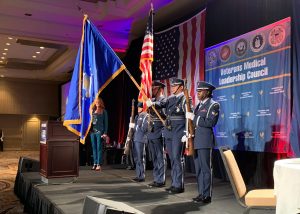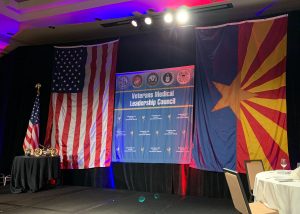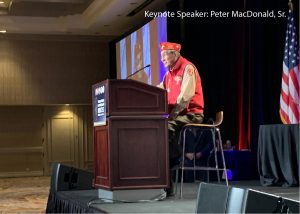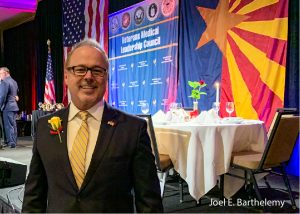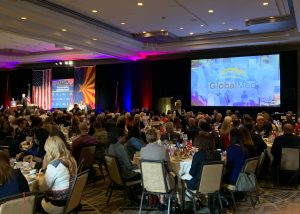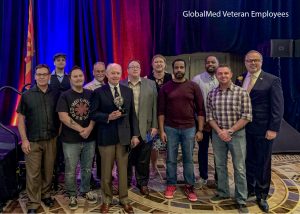
Have you supported a hero lately?
On Nov. 8, the Veterans Medical Leadership Council (VMLC) hosted their 17th Annual Heroes Patriotic Lunch at the Arizona Biltmore in Phoenix. This annual fundraiser honors veterans and military service members who’ve served our nation – and encourages everyone in the community to give back to our veterans. GlobalMed was the presenting sponsor this year and we were excited to see so many veterans honored; we also had a chance to share the story of how telemedicine is helping America’s heroes.
This year’s lunch presentation featured honorees from World War II, the Korean War, the Vietnam War, the Cold War and the War on Terror. While 100-year-old Gino Mei, a WWII veteran, stole the show with his award acceptance speech, the lunch also featured a fascinating talk from keynote speaker Peter MacDonald, Sr., USMC, a Navajo Code Talker.
MacDonald told the crowd about the 29 bilingual Navajos recruited by the U.S. Marines Corps who developed a top-secret military code for tactical wartime use. Using just paper, pencil and their memory, in 1942 these Navajos created the only official military code not broken by an enemy. Their codes were individual and complex, and tough to break precisely because doing so required the ability to bridge the alphabetical difference between Native American languages and other tongues. That difference was so vast that code talkers used words from their language for each letter or punctuation symbol of the English alphabet. Each word had to be translated into English, with the first letter of that word providing one letter in the message. Punctuation codes were based on visual appearance, such as using the Navajo word for ear to indicate a question mark because they thought it resembled a human ear.
The Japanese intercepted these coded messages over military telephone or radio – but they only heard a list of seemingly unrelated Navajo words. The code talkers offered an intense strategic advantage for numerous military efforts, including the Battle of Iwo Jima. Their efforts stand today as a testament to the ingenuity and patriotism of the U.S. military.
Helping Veterans in Need
For almost ten years now, GlobalMed has been a strong supporter of the VMLC, a 501 (c) (3) non-profit. Nearly 98 percent of every dollar raised or donated goes to local veterans in need. These American heroes deserve the same quality of life as anyone else, but many face difficult challenges. In addition to transitioning to civilian life, they may deal with post-traumatic stress disorder (PTSD), survivor’s guilt or injuries sustained in combat. Roughly 20 percent have a service-connected disability. To help these veterans live active and successful lives, the VMLC runs several programs that can assist them with clothing, medical needs, transportation, housing, suicide prevention and other vital lifelines.
A few of these programs include:
- The VMLC Returning Warrior Program: Veterans in crisis receive immediate financial assistance for help with rent, utilities, food, clothing and transportation.
- Annual Arizona Veterans Standdown:This one-stop event raises money for community services for the homeless.
- Central AZ Shelter Services: Homeless veterans receive emergency dental services and low-rent “move in” kits.
- Veteran & K-9 Support: This support program assists PTSD veterans in finding and training rescue dogs for lifelong partnership.
The GlobalMed Mission
As a Marine Corps Reserve Veteran, part of my motivation for founding GlobalMed was to help all veterans receive access to quality care. I saw the challenges firsthand with my father, a U.S. Army veteran of both World War II and the Korean War. Because he lost much of his hearing in the wars, his retirement years included arduous monthly visits to audiology specialists. He lived less than a mile from a VA hospital but it had no audiologist – so he had to wake up at 5:30 a.m., drive to the VA bus stop and ride two hours to his appointment. After he was seen, he’d wait around the rest of the day for the 85-mile bus ride home. It was usually a 13-hour day.
I wanted to change that – for my father and every other veteran who waits too long and travels too far for care. Many veterans live in rural areas where the U.S. provider shortage is particularly dire. Waiting months for an appointment or traveling hundreds of miles to see a provider isn’t just inconvenient; it’s incredibly tough for veterans with disabilities and economic hardship.
Today more than 10 percent of GlobalMed employees are veterans. Our mission is to provide quality, timely care for all because every life matters. But we also focus on assisting veterans through innovative care delivery models that can reach them wherever they are. The Veterans Health Administration is one of our largest customers; nearly a million veterans used GlobalMed technologies last year to receive virtual care for 4 million appointments.
Next week we’ll share one young veteran’s story of how telemedicine has helped him adapt to civilian life and pursue his goals. In the meantime, please consider getting involved with the VMLC or another veteran support organization. As Peter MacDonald said at the lunch, “I feel at home here because all of you were in the service or are in the service or have someone in the service.” If you take a close look at the people you care about, there’s probably a veteran in your life too.

